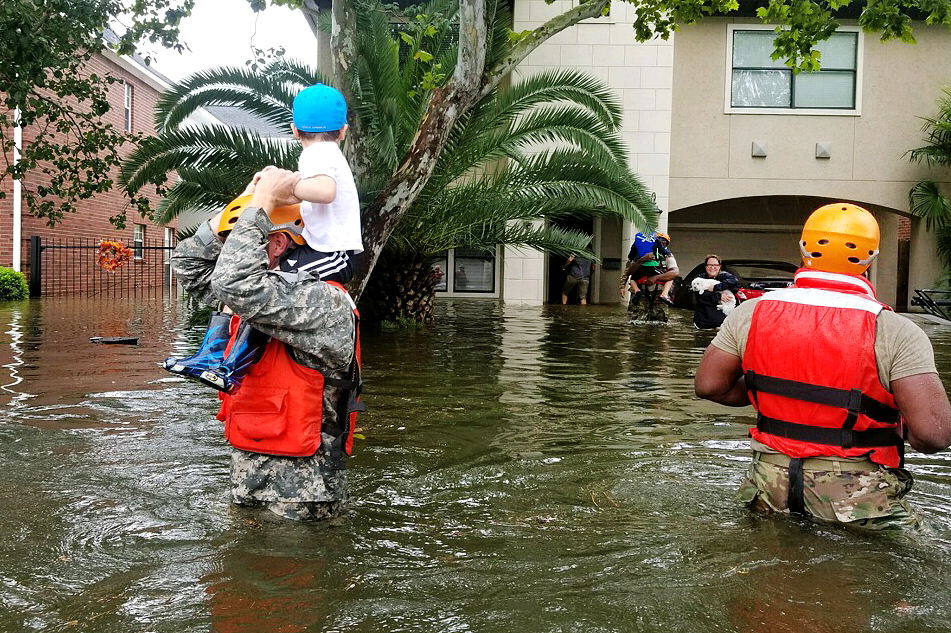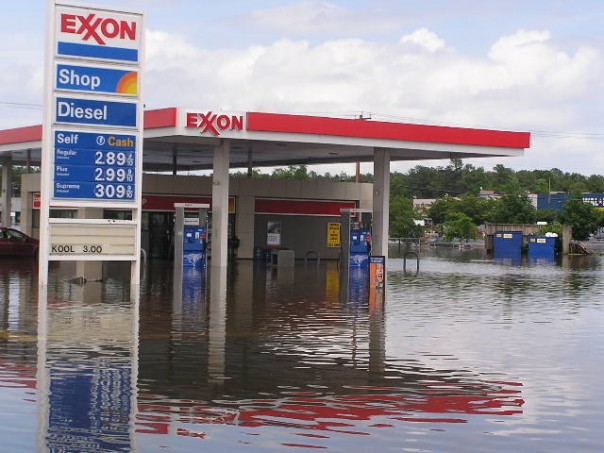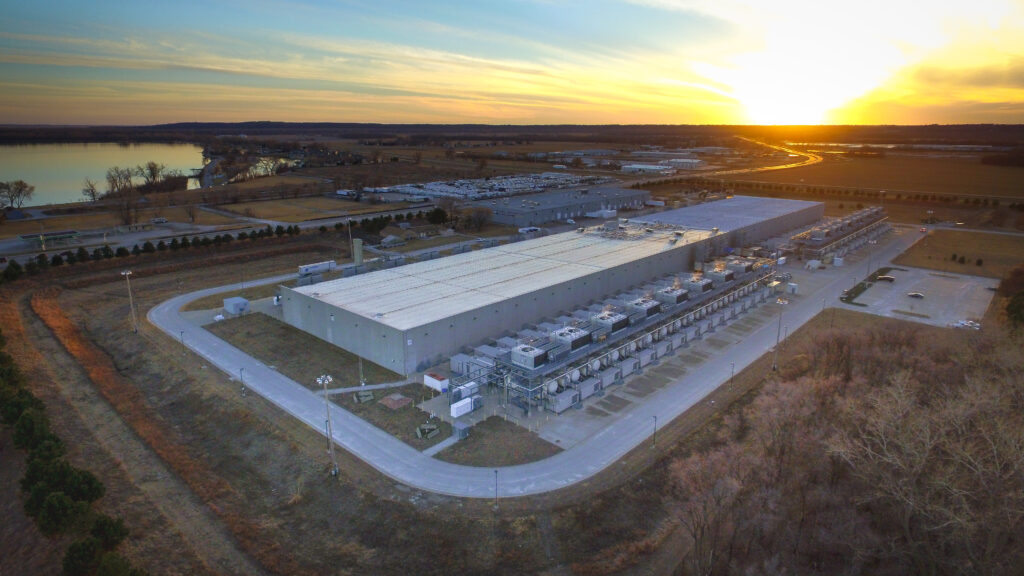Oil companies have long been aware that their products cause global warming and the impacts, including from rising seas, could be catastrophic. From a scientist who warned executives in 1959 that New York could be submerged, to a confidential 1988 Shell report that raised the possibility of abandoning inundated low-lying areas, the industry has shown clear internal acknowledgement of the potential consequences of unabated fossil fuel burning.
Those consequences are starting to play out, and studies continue to project alarming climatic trends for the future. One such study published April 16 in the journal Scientific Reports projects an exponential increase in the frequency of coastal flooding from rising seas. Extreme flooding will become an annual and eventually a practically daily hazard for many U.S. coastal cities, barring efforts to mitigate climate change and reduce sea level rise.
“Sea-level rise will likely cause ‘once-in-a-lifetime’ coastal flooding events to occur nearly every day before 2100,” researchers from the U.S. Geological Survey, University of Illinois at Chicago, and University of Hawaii wrote.
The study is the first to examine continuous increases in extreme flooding in the coming decades, and finds the likelihood of extreme flooding doubles approximately every five years into the future. This extreme — a one-in-50-year flood event — will occur every year for 70 percent of the coastal U.S. before 2050. And the 50-year extreme water level will be exceeded almost daily during high tide before the end of the century for 90 percent of the U.S. coast.
In other words, flooding driven by sea level rise will be much more severe and frequent than many people realize. As the study concludes, “Our society has yet to fully comprehend the imminence of the projected regime shifts in coastal hazards and the consequences thereof.”
Flooding at an Exxon gas station in Seaford, Delaware, in 2006. Credit: DCist, CC BY 2.0
While society generally may not yet understand these consequences, major oil companies have understood the risks of climate change driving these impacts for decades.
“The fossil fuel companies have for decades been well aware that their products would cause sea level rise and flooding that would result in major economic damages,” Stanford University researcher Ben Franta, who studies the history of climate change science and politics, told DeSmog. “And they didn’t warn the public but rather kept their predictions concealed in confidential documents, only recently discovered.”
Early Warnings of Climate Risk
Indeed, Big Oil has been aware of the climate change problem long before it was on the public radar — even before the moon landing. In 1959 the physicist Edward Teller spoke at a symposium attended by oil executives marking the oil industry’s 100th anniversary. Teller spoke of the greenhouse effect and gave the following warning:
“It has been calculated that a temperature rise corresponding to a 10 percent increase in carbon dioxide will be sufficient to melt the icecap and submerge New York. All the coastal cities would be covered, and since a considerable percentage of the human race lives in coastal regions, I think that this chemical contamination [of carbon dioxide in the atmosphere] is more serious than most people tend to believe.”
In 1968, the Stanford Research Institute presented a report to the American Petroleum Institute (API) that warned that global warming could result in “potentially serious environmental damage worldwide.” According to that report, “If the Earth’s temperature increases significantly, a number of events might be expected to occur including the melting of the Antarctic ice cap, a rise in sea levels, warming of the oceans…”
And three years before that, in 1965, the president of API described research into climate change caused by fossil fuels, declaring at an oil industry conference, “The substance of the report is that there is still time to save the world’s peoples from the catastrophic consequence of pollution, but time is running out.”
“By 1982, Exxon, in an internal document marked ‘proprietary,’ foresaw that global warming from its products could cause potentially ‘catastrophic’ effects, including sea level rise, which could ‘cause flooding on much of the U.S. East Coast, including the State of Florida and Washington, D.C.,’” Franta explained. “Exxon noted that adaptive measures could cost ‘a few percent of the gross national product’ by the middle of this century — $400 billion in today’s dollars.”
Next shoe drops in #exxonknew scandal–they calculated sea level rise into their new facilities, while denying it https://t.co/BoWDqDafm0
— Bill McKibben (@billmckibben) December 31, 2015
That 1982 Exxon document also included this statement: “At the high end, some scientists suggest there could be considerable adverse impact including the flooding of some coastal land masses as a result of a rise in sea level due to melting of the Antarctic ice sheet.”
A 1988 Shell confidential report called “The Greenhouse Effect” delved even further into possible climate impacts and socioeconomic consequences. That report warned of impacts including “significant changes in sea level, ocean currents, precipitation patterns, regional temperature and weather,” and even discussed human migration and the abandonment of cities.
Shell “predicted that fossil fuels in the 21st century ‘would induce a 60-70 centimeter rise of the global sea level’ and that ‘a possible subsequent disintegration of the West Antarctic Ice Sheet would result in a worldwide rise in sea level of 5-6 meters,’” Franta further explained. “The company observed that ‘More than 30 percent of the world’s population live within a 50-kilometer area adjoining oceans and seas, some even below sea level. Large low-lying areas could be inundated (e.g., Bangladesh) and might have to be abandoned or protected effectively.’”
Rising Seas and Rising Costs
These revelations of what the fossil fuel industry knew and when have given rise to a wave of climate liability lawsuits brought mostly by local governments seeking to hold companies like Exxon and Shell accountable for costs associated with climate impacts like sea level rise that these companies foresaw.
On Monday the City of #Honolulu filed a lawsuit against 10 oil and gas companies, seeking monetary damages to help pay for costs associated with #climate impacts like sea level rise and flooding. https://t.co/jvYfv9QSAi
— DeSmogBlog (@DeSmogBlog) March 10, 2020
Coastal cities like New York, San Francisco, Baltimore, and most recently Honolulu, as well as the “Ocean State” of Rhode Island have all sued major oil companies in the last few years. The lawsuits say these companies, not taxpayers, should be on the hook for climate damage and adaptation costs. These costs are expected to rise as adaptation becomes even more essential.
This latest coastal flooding study indicates that cities will need to be prepared for large expenses as the water rises. “Our findings underscore the need for immediate planning and adaptation to mitigate the societal impacts of future flooding,” the researchers write.
“This new study points out that the damages of sea level rise from fossil fuels are not a far-off eventuality, but imminent and widespread,” Franta told DeSmog. “Given that the fossil fuel industry foresaw these damages, failed to warn the public, obstructed efforts to prevent the damage, and profited from the products causing the damage, this study underscores the importance of holding fossil fuel producers accountable as these damages continue to materialize.”
Main image: A Texas Army National Guardsman carries a small boy on his shoulders during flooding caused by Hurricane Harvey in Houston, Aug. 27, 2017. Credit: Army National Guard/Lt. Zachary West, public domain
Subscribe to our newsletter
Stay up to date with DeSmog news and alerts







